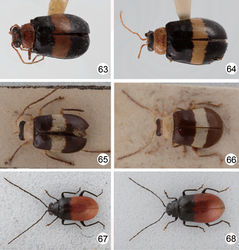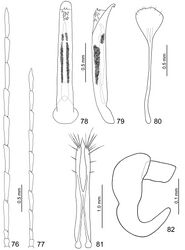Difference between revisions of "Arthrotus flavocincta"
m (Imported from ZooKeys) |
m (1 revision) |
(No difference)
| |
Latest revision as of 11:58, 13 August 2013
| Notice: | This page is derived from the original publication listed below, whose author(s) should always be credited. Further contributors may edit and improve the content of this page and, consequently, need to be credited as well (see page history). Any assessment of factual correctness requires a careful review of the original article as well as of subsequent contributions.
If you are uncertain whether your planned contribution is correct or not, we suggest that you use the associated discussion page instead of editing the page directly. This page should be cited as follows (rationale):
Citation formats to copy and paste
BibTeX: @article{Lee2013ZooKeys323, RIS/ Endnote: TY - JOUR Wikipedia/ Citizendium: <ref name="Lee2013ZooKeys323">{{Citation See also the citation download page at the journal. |
Ordo: Coleoptera
Familia: Chrysomelidae
Genus: Arthrotus
Name
Arthrotus flavocincta (Hope, 1831) comb. n. – Wikispecies link – Pensoft Profile
- Galleruca flavocincta Hope, 1831: 29.
- Monolepta flavocincta : Weise 1924[1]: 168.
- Dercetis flavocincta : Maulik 1936[2]: 355.
- Dercetina flavocincta : Kimoto and Takizawa 1972[3]: 222 (Nepal); Kimoto 1989b[4]: 229 (Thailand, Laos, Vietnam).
- Antipha flavofasciata Baly, 1879: 456; Maulik 1936[2]: 355. (as synonym of Dercetina flavocincta) synonymy confirmed
- Dercetes femoralis Weise, 1922: 97; Kimoto 1989: 229 (as synonym of flavocincta) synonymy confirmed
Type series
Galleruca flavocincta: Holotype ♀ (BMNH), labeled: “Type (circular label with red border) / Antipha flavocincta Hope Type (Galleruca) / Hardwicke Bequest”.
Antipha flavofasciata: Holotype ♀ (BMNH), labeled: “Type (circular label with red border) / Assam / Antipha flavofasciata Baly / Antipha flavofasciata Baly Cist. Ent. II p. 56 [on the back] / Baly Coll.”.
Dercetina femoralis: Holotype ♂ (NHRS): “Tonkin Montes Mauson / April,May 2-3000’ H Frustorfer / femoralis m. / Typus (red label) / NHRS-JLKB 000020341”.
Material examined
INDIA: 2♀♀, Assam, 15.VIII.1918 (BMNH); 1♀, Assam, Jorhat, 3721, coll. H. E. Andrewes (BMNH); 1♀, Darjeeling, Bengal, Debrepani, 6000’, 18.IX.1929, leg. J.C.M. Gardner (BMNH); 2♂♂, 1♀, Darjeeling, Bengal, Lopchu, 5000’, 21.IX.1929, leg. J.C.M. Gardner (BMNH); 1♀, Mongpoh, Khasi Hills, 2178, coll. H. E. Andrewes (BMNH); 2♀♀, Sikkim (MUHUB); 2♀♀, Simla (MNHUB); LAOS: 1♀, Vientiane Prov., Ban Van Eue, 15.III.1966, leg. Native Collector (BPBM); 1♀, Xiengkhoang Prov., Ban Theuong, 1035 m, 10-17.VIII.1960, leg. R. E. Leech (BPBM); 1♀, Blao (Balao), 500 m, 14–21.X.1960, leg. C. M. Yoshimoto (BPBM); 1♀, Muong Sing, NW of Luang Prabang, 650 m, 6–10.VI.1960, leg. S. Quate & L. Quate (BPBM); THAILAND: 1♀, Chiengmai, 3.XII.1962 (KMNH); 2♀♀, Khao Yai Natioal Park, 800–1000m, 18.VIII.1992, leg. D. Furth (USNM); VIETNAM: 2♀♀, Dalat, 1500 m, 29.IV.–4.V.1960, leg. C. M. Yoshimoto (BPBM); 1♀, Fyan, 1200 m, 11.VII. –9.VIII.1961, leg. N. R. Spencer (BPBM); 1♀, M’Drak, E of BanMeThuot, 400-600 m, 8–19.1960, leg. C. M. Yoshimoto (BPBM);
Diagnosis
Females of Arthrotus flavocincta are similar to Dercinta unifasciata with antennomere IV much long than III, but differs by more slender antenomeres IV-VII (4.5–5.7 times longer than wide in Arthrotus flavocincta in contrast with 6.0-6.6 times longer than in wide in Dercetina unifasciata). Males of Arthrotus flavocincta are easily recognized by the similar length of antnnomeres III and IV.
Redescription
Color (Figs 65–66) bluish black, head, prothorax, coxae, and tibiae yellowish brown; elytra with one transverse white stripe in middle; vertex darkened. Head smooth and impunctate. Pronotum transverse, 2.1 times wider than long, evenly convex on disc and lacking fovea or punctured depression, disc with scattered fine punctures; lateral margin straight, anterior margin slightly concave, posterior margin slightly rounded. Elytra parallel-sided, apex convergently rounded, 1.6 times longer than wide, disc with random punctures, epipleurae smooth and impunctate.
Male. Length 4.3 mm, width 2.0 mm. Antenna filiform (Fig. 76), antennomere II as long as antennomer III, ratio of length of antennomeres III to XI about 1.0: 3.5: 3.4: 3.3: 3.4: 3.3: 3.0: 2.8: 3.4; ratio of length to width of antennomeres III to XI about 2.1: 5.9: 5.7: 5.7: 5.4: 5.2: 4.5: 4.2: 5.4. Penis (Fig. 78) extremely slender, about 9.4 times longer than wide, parallel-sided, basally widened but apically narrowed; apex narrowly rounded; tectum membranous, with dense long setae; weakly curved in lateral view, apex hooked (Fig. 79); endophallic sclerites elongate, about 0.6 times as long as penis, with a cluster of long setae near apex; in lateral view apex curved; from basal 1/3 to apical 1/3 dorsally covered with a pair of longitudinal areas covered by dense setae. Female. Length 4.4–6.6 mm, width 2.4–3.3 mm. Antenna much shorter than male, comparatively narrower than male (Fig. 77), ratio of length of antennomeres III to XI about 1.0: 1.8: 1.8: 1.8: 1.8: 2.0: 1.8: 1.8: 2.3; ratio of length to width of antennomeres III to XI about 3.1: 5.7: 4.5: 4.6: 4.5: 5.2: 4.9: 5.1: 5.2. Sternite VIII (Fig. 80) weakly sclerotized subapically, apex rounded, setae along lateral and apical margins, spiculum long. Spermathecal receptaculum (Fig. 82) slightly swollen; pump narrow and strongly curved, apex narrowly rounded; spermathecal duct short and wide, shallowly projecting into receptaculum. Gonocoxae (Fig. 81) narrowly connected in middle, extremely elongate, about 6.6 times longer than wide, slightly curved inwards at apical 1/4, with one short setae at apical 1/3, another short setae near apex, six to eight setae at apex.
Color variation. Some specimens have blackish brown meso- and metacoxae, femora, and vertex, or yellowish brown abdomen.
Distribution
India, Laos, Nepal, Thailand, Vietnam.
Taxon Treatment
- Lee, C; Bezděk, J; 2013: Revision of the genus Dercetina from Taiwan and their similar species, with description of a new species from Myanmar (Insecta, Chrysomelidae, Galerucinae) ZooKeys, 323: 1-33. doi
Other References
- ↑ Weise J (1924) Pars 78: Chrysomelidae: 13. Galerucinae. In: Schenkling S (Ed) Coleopterorum Catalogus. W. Junk, Berlin, 225 pp.
- ↑ 2.0 2.1 Maulik S (1936) The Fauna of British India, including Ceylon and Burma. Coleoptera. Chrysomelidae (Galerucinae). Taylor & Francis, London, 648 pp.
- ↑ Kimoto S, Takizawa H (1972) Chrysomelid-beetles of Nepal, collected by the Hokkaido University scientific expedition to Nepal Himalaya, 1968 Part I. Kontyû 40: 215-223.
- ↑ Kimoto S (1989b) Chrysomelidae (Coleoptera) of Thailand, Cambodia, Laos and Vietnam. IV. Galerucinae. Esakia 27: 1-241.
Images
|

